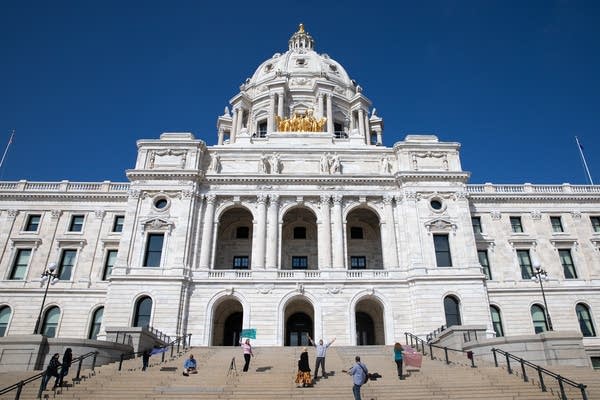Minnesota Legislature lurches toward likely special session

Updated: May 18, 1:23 a.m. | Posted: May 17, 9:08 p.m.
The Minnesota Legislature tumbled toward a special session after adjourning early Monday with few of the year’s big issues resolved.
Sunday’s finale for votes was defined more by inability to advance a construction projects bill, reach agreement on how to designate $1.8 billion of federal aid and fully resolve a standoff over state employee contracts.
As time ran out, lawmakers resigned themselves to yet another year of overtime work. House Speaker Melissa Hortman, DFL-Brooklyn Park, said the finish shouldn’t obscure the bipartisan work done at the start of the COVID-19 onset.
“This is the pandemic session,” she said, adding that it stymied other work the Legislature had planned to do.
Create a More Connected Minnesota
MPR News is your trusted resource for the news you need. With your support, MPR News brings accessible, courageous journalism and authentic conversation to everyone - free of paywalls and barriers. Your gift makes a difference.
Gov. Tim Walz has the sole power to schedule a special session, and he could announce his plans during a late-morning call with Democratic lawmakers.
Senate Majority Leader Paul Gazelka, R-East Gull Lake, said he spoke with Walz on Sunday night.
“The governor said June 12 that there would be a special session. So we’ll figure out that,” Gazelka told his colleagues. “Unfortunately we still need to have our sleeves still rolled up to get some work done.”
Senate Minority Leader Susan Kent, DFL-Woodbury, said Republicans waited too long to get key bills moving in the session.
“Unfortunately, political posturing and stalling from our Republican colleagues stood in the way of legislation that is at the core of caring for Minnesotans,” she said in a statement issued after adjournment.
House Minority Leader Kurt Daudt, R-Zimmerman, said the extra time will “give us further clarity on our state's financial situation, time to evaluate our response to the pandemic, and time to make better decisions.”
This weekend, neither chamber could muster the three-fifths vote needed to pass the construction projects bill. The $2 billion House plan went down on Saturday and a plan about half that size fell a couple of votes short in the Senate on Sunday.
In arguing for his $998 million bill, Senate Capital Investment Committee Chair David Senjem said something was better than nothing. It would pay for various road projects, zoo upgrades, historical site improvements and wastewater plant needs.
“Building things that people can drive on, walk on, recreate and work in and so on and so forth is what people like,” said Senjem, R-Rochester. “And it’s what I think we should be spending a lot more money on.”
“This is the last train leaving the station this session for a bonding bill,” Gazelka said before the vote.
He stressed that there haven’t been bills of this size that have won Republican support. He said going much bigger would add to long-term debt costs at a time when the state is searching for any savings it can find.
But Democrats attacked the bill as a missed opportunity, given very low interest rates and Minnesota’s exceptionally high bonding rating that makes it cheaper to borrow. They said the economy needs a jolt, and public infrastructure can provide that.
“Let’s just hope that the stars are aligned and it all works out and we can compromise and negotiate and we can wind up with a very robust bonding bill that will produce the kind of jobs that we need,” said Sen. Sandy Pappas, DFL-St. Paul.
Sen. Jason Isaacson, DFL-Shoreview, said the bill the Senate voted on would shortchange public colleges and universities, which were seeking more money to rehabilitate campus buildings.
“We can fix an older building and make it work or let it run itself out and build a newer building and spend five times as much money,” Isaacson said. “It doesn’t make sense financially.”
Uncertainty also surrounded state contracts for tens of thousands of state workers. The House voted last week to ratify pacts negotiated last year between employee unions and the Walz administration. They pushed more health costs onto workers but included across the board raises of 2.5 percent each year.
The Senate made its ratification contingent on withholding the second raise, due to take effect in July. Republicans said Minnesota can no longer afford those raises after coronavirus tanked the state budget, which is now projected to be running a deficit.
State law gives the Legislature power to pass contracts on an up-or-down basis. There could be litigation or twists yet to come over the way lawmakers handled them.
House Majority Leader Ryan Winkler told reporters early Monday that even though the two chambers acted separately, they both might have met the threshold for ratification. It wouldn’t be the first time that a clever legal analysis got state workers out of a bind like this. A similar workaround was done in 2017.
A plan for a Monday farewell to retiring lawmakers caused its own rift. Gazelka initially said there would be a Senate session on the Capitol lawn so all senators could hear retirement speeches, given that social distancing has limited attendance of meetings in the usual chamber.
But a few Democrats balked at the idea, saying it was wrong for lawmakers to hold a big gathering when things like graduation ceremonies are frowned on.
“Us elected officials should be held to the same standard,” Sen. Matt Little, DFL-Lakeville, wrote on Twitter. “With regrets, I will not be attending.”
After the final adjournment, Gazelka said the speeches would be postponed until nicer weather and a completed workload is at hand.